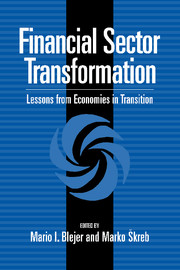Introduction: Financial Reforms and Economic Transition: An Overview of the Major Issues
Published online by Cambridge University Press: 05 November 2011
Summary
The essays in this volume deal with banking sector reform and capital markets in transition economies. To place these issues in broader context, however, we first discuss here a number of related questions that provide an appropriate framework for the understanding of the specific and crucial role played by financial reforms in the context of post-Communist transformation.
These questions have arisen because various transition economies appear to have achieved a relatively high degree of macroeconomic stability, especially compared with the situation observed at the beginning of the process, in the early 1990s. First, once macroeconomic stability seems to have been achieved, should policy makers continue to pursue macroeconomic stabilization – should it remain a permanent concern in transition economies? Second, since transition should be, logically, a time-bounded process, what is the appropriate time horizon for policy makers? Should policy makers concentrate more on long-term issues or should they focus on immediate transition problems? Third, how do the trends toward economic globalization interact with financial development in transition countries? Finally, what is the role of commercial banks in transition and why are banking reforms so difficult to complete? We attempt to deal with these questions in order to provide a broad analytical framework for the contributions collected here.
SHOULD WE STOP WORRYING ABOUT MACROECONOMIC STABILITY?
Once achieved, the quest for price stability may lose its appeal (especially for politicians), as if, in fact, stable prices were a natural state of the economy. After inflation has been conquered, it is not unusual for macroeconomic populism to reappear, concentrating its efforts on seeking “development” with little concern for maintaining price stability.
- Type
- Chapter
- Information
- Financial Sector TransformationLessons from Economies in Transition, pp. 1 - 16Publisher: Cambridge University PressPrint publication year: 1999
- 1
- Cited by

